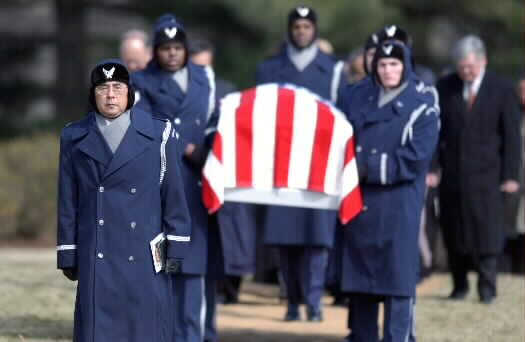Chaplain (Colonel) Richard K. Hum marches in front of U.S. Honor Guard members carrying the casket of
shuttle astronaut Lieutenant Colonel Michael Anderson on March 7, 2003, at Arlington National Cemetery.
(U.S. Air Force photo by Staff Sgt. Michael Holzworth)
by Staff Sgt. C. Todd Lopez
Air Force Print News
8 May 2003 – ARLINGTON, Virginia — More than 280,000 people are buried at Arlington National Cemetery. Another 25 are added to those ranks each day.
For the organization charged with providing spiritual support to those left behind when a veteran passes away, those numbers can add up to a hectic schedule. But according to the head of the Air Force’s Arlington Chaplaincy, it is a vitally important function requiring absolute and undivided attention, each and every time.
“When somebody has to be buried, one of the rites of the church is for burial. We are here to provide those religious services for people,” said Chaplain (Colonel) Richard K. Hum. “We provide religious rites and services for Air Force members and their dependents.”
The Air Force has three Protestant chaplains at Arlington National Cemetery. The chaplaincy also has contracts with both a Jewish rabbi and a Catholic priest. For other faiths, the chaplaincy makes recommendations to family members on where to find somebody to perform services.
Whatever the faith of the person being buried, the chaplains do their best to accommodate families’ needs, Hum said.
“Our standard of care is to call the family at least seven days in advance of the funeral to express our condolences, to answer questions about the service we are going to do, and to gather information from them,” Hum said. “At that time, the family may also tell us the types of hymns they would like us to use in the chapel services, and also various poems or scripture they would like us to use. Whatever the family says, we will try to do.”
For some families, attending a funeral at Arlington National Cemetery may be the first time they have had any contact with the military, the chaplain said.
“Some families come here, and they don’t recognize the military or even the difference between the Army, the Navy and the Air Force,” Hum said. “But they are touched by what the military is still willing to do for their loved ones, even after 50 years. We are still willing to say thank you, and that what their father or grandfather has done is important. We needed them, and as a result of their service, we have the freedoms we have today.”
The chaplains at Arlington also perform traditional chaplain roles, Hum said. The chaplains minister to both the relatives of the deceased and to active-duty airmen.
“When we make contact with the families, it requires us to sometimes do bereavement or grief counseling,” Hums said. “I talked to a lady just the other day whose husband was being buried here. The two had been married for 65 years. She was sick and wasn’t able to come to the funeral. So, it takes some time to be able to talk with people, and in some cases, to pray with people over the phone.”
The chaplains also have a counseling role at their home unit, the 11th Operations Group at Bolling Air Force Base, Washington, D.C.
“While our primary job is here at the cemetery, we are also attached to the 11th OG,” Hum said. “We do visitation of the Air Force Band and the Air Force Honor Guard, who are also part of the 11th OG. We go over and spend time with those units each week and do counseling with them as well.”
Two enlisted airmen are also assigned to the cemetery to carry out the many functions typically associated with a military unit, Hum said.
“We have all kind of administrative duties here, like any other military unit,” Hum said. “The enlisted chaplain assistants here also serve as escorts for the Arlington Ladies.”
The Arlington Ladies are volunteers who attend funerals at the cemetery to ensure no military member is buried without somebody in attendance. The roots of the program date to 1948, when then-Air Force Chief of Staff Gen. Hoyt S. Vandenberg and his wife noticed airmen were being buried with only the chaplain and an honor guard member in attendance. Today, there are Arlington Ladies for the Air Force, Army and Navy.
At military funerals, it is the deceased who is most visibly honored with music, prayer and traditional military ceremony. But often, the military chaplains themselves feel honored, Hum admitted.
“As chaplains, it is a great honor and privilege to be able to preside over these services,” Hum said. “In a lot of cases you have people (who) have served their country many years ago. We as chaplains are often the final military person to speak to their families. And we tell them, ‘your country is very thankful for the service of your husband, your father, your grandfather.’ It is our job to convey that message, and we think it is a great privilege.”
Michael Robert Patterson was born in Arlington and is the son of a former officer of the US Army. So it was no wonder that sooner or later his interests drew him to American history and especially to American military history. Many of his articles can be found on renowned portals like the New York Times, Washingtonpost or Wikipedia.
Reviewed by: Michael Howard

